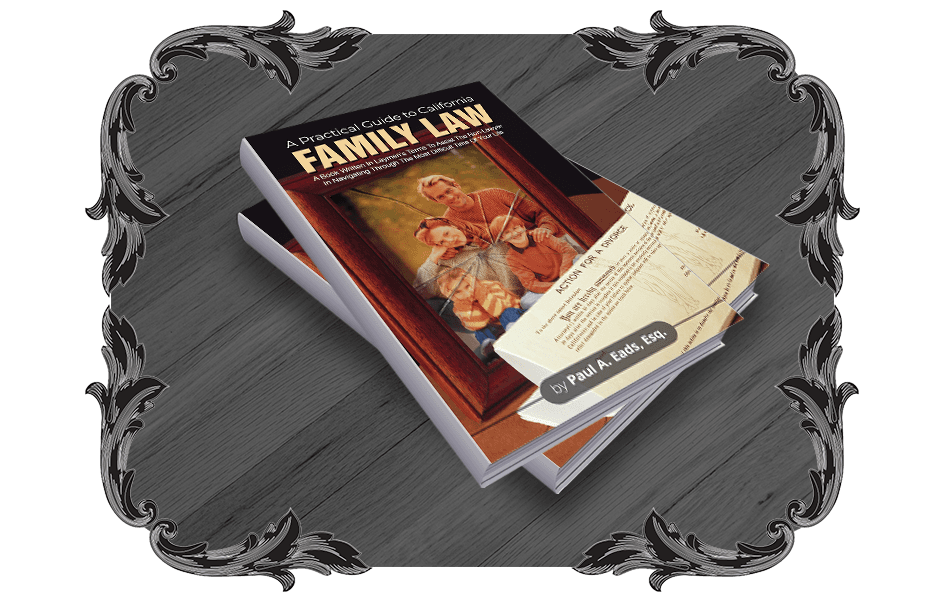
Dedicated Experience in Family Law on Your Side.
Dependent Exemptions
Dependent Exemptions refer to the number of children that you claim on your taxes. In addition to dependent exemptions, other noteworthy exemptions include a new spouse or other eligible person (parent/grandparent, nephew etc.) that you routinely claim as a dependent on your tax returns. Obviously the more exemptions that you qualify for on your taxes, the lower your tax liability will be.
How this lowered tax liability impacts your ability or need to pay child support depends on whether you are the Obligor (higher earner/payor of support) or the Obligee (lower earner/recipient of support). For the Obligor, the greater number of exemptions you have, the greater your ability is to pay child support as more of your income is being kept by you as opposed to being paid to the IRS and the Franchise Tax Board.
For the Obligee, the greater number of exemptions that you have, the less of a need you have for child support as you are able to keep more of your income as opposed to being paid to these same agencies. Although the dependent exemption is typically awarded to the custodial parent (parent with larger custodial time), it may be awarded to the non-custodial parent if the parties both agree. If that is done, the custodial parent will need to complete IRS form 8332 to release the dependent exemption and to ensure that the IRS is clear as to who will be claiming the child on their taxes.

This book, written By Paul A. Eads, helps readers know how to prepare before they initiate a legal endeavor and helps make the legal terms of family law issues easier to understand.


Client Testimonials
See What Others Are Saying
-
"Mr. Eads, you are a true master in your field and I will always be available should any of your prospective clients want to contact me as a reference."Mr. Eads, you are a true master in your field.- Peter K.
-
"Mr. Eads worked hard for me and I am confident he will do the same for you."My ex boyfriend was very abusive. His attorney seemed to be very aggressive and was always filing Ex Parte (emergency) hearings for me to appear in court. Due to a cost issue, I attempted to handle matters myself but it seemed that I could not get my point accrues to the judge who seemed to be familiar with my ex boyfriend’s attorney. I found Mr. Eads in the phonebook and I thought I would give him a call. Mr. Eads was able to get the restraining order I was seeking and my ex boyfriend ended up paying Mr. Eads’ attorney fees. I can now feel rest-assured that my daughter and I will be safe. I also happy that I do not have to deal with my ex’s attorney anymore. Mr. Eads worked hard for me and I am confident he will do the same for you.- K.Y.
-
"He was very sympathetic to my cause and was very reassuring when I needed his assistance."I was very pleased with the outcome of my case.- Albert N.
-
"I was barely able to make ends meet. Mr. Eads worked out a payment plan with me and reduced my arrears."I will be able to pay it off quicker and with more money left over with the payment Mr. Eads was able to negotiate for me.- John H.
-
"The outcome was much more than I ever expected to receive."My previous attorney failed to show up for my court date and as a result, the matter was set for trial without any input from my side. I desperately sought out an attorney but most of them wanted a huge retainer up front. I found Mr. Eads and when I went in for a consultation, I found that his retainer was more than reasonable. I also liked the fact that he practices exclusively family law and seems very familiar with the local judicial officers. I felt very comfortable with Mr. Eads in my corner going into my trial and I found that the outcome was much more than I ever expected to receive. Mr. Eads was very thorough in my case evaluation and helped me get everything I was entitled to.- J.L.
-
"Mr. Eads when to bat for me and in my opinion, hit a home run."I decided to hire Mr. Eads based on his experience and the fact that his practice is limited to Family Law.- Veronica S.
-
"Mr. Eads was able to help structure a settlement that allowed me to keep my business while sharing the business debts with my ex."I am a business owner and when I got divorced, I was terrified that I would lose my business. My business was also heavily leveraged against and I did not have enough capitol to sustain the business and pay my wife spousal support. My ex had an attorney who was very intimidating and kept pressuring me to liquidate the business so that I could pay his attorney’s fees. I was referred to Mr. Eads by a friend. Mr. Eads was able to help structure a settlement that allowed me to keep my business while sharing the business debts with my ex. I was also able to shorten my spousal support obligation. I really appreciate Mr. Eads professionalism and guidance during these difficult times.- J.A.
-
"Not only did Mr. Eads get my daughter returned to me, I was able to have full physical custody."I am honored to write this review for Mr. Eads after he helped reunify me with my daughter after my ex abducted her and moved to Arizona. I was devastated when I came home from work to find my ex had left with all our daughter’s belongings. I called the police who told me I needed to hire an attorney. I came across Mr. Eads’ website and I was impressed with his bio. I contacted him immediately and within days, we were in court requesting that my the DA Abduction unit assist me in the return of my daughter. Not only did Mr. Eads get my daughter returned to me, I was able to have full physical custody and my ex has summer and holiday visitation. Mr. Eads is truly my hero. Thanks Mr. Eads!- Paul W.